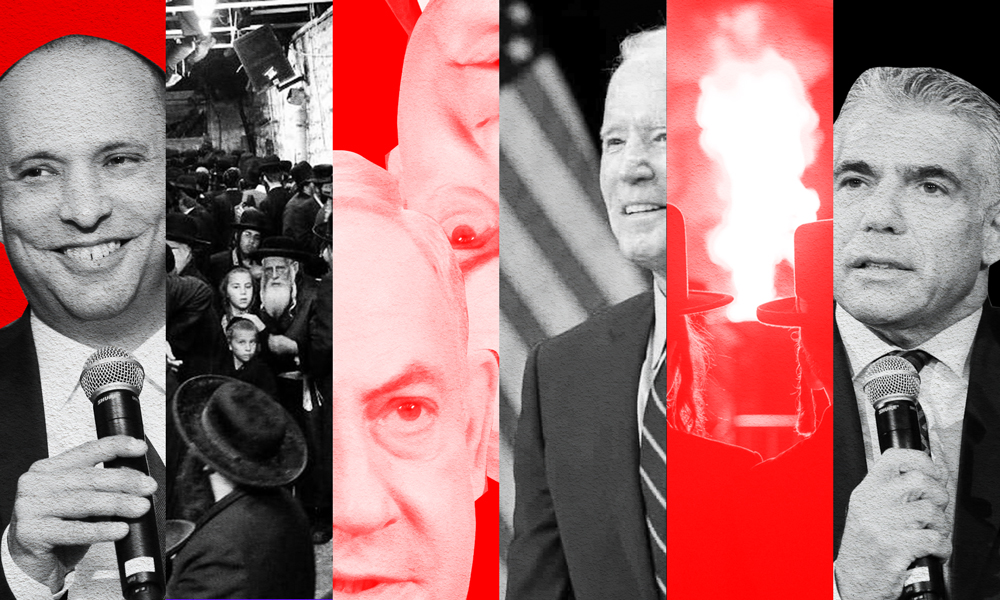
1. The politics of the tragedy
This week’s dispatch comes to you from Israel, a nation still trying to overcome the horrific loss of 45 lives during a Lag B’omer celebration on Mount Meron last Thursday.
For a relatively young nation, Israel has gained, unfortunately, too much experience in dealing with catastrophic events. When they take place, Israelis, in a blink of an eye, put aside tensions and divisions and unite behind calls to console, heal and assist those in need. The fact that victims of the Mt. Meron stampede were all ultra-Orthodox, gathered for a religious ceremony alien to many secular Israelis, did not diminish in any way the sense of loss felt by all Israelis, regardless of beliefs, lifestyles, or political affiliations.
No less characteristic was the way Israel’s political players reacted to the tragedy.
Within hours, while bodies were still being pulled out and identified, a partisan battle broke out: Critics of the Netanyahu government demanded the establishment of an independent inquiry panel to explore any negligence or malice that led to the event, and to ensure accountability. They pointed to Netanyahu’s ministers in charge of public safety as responsible for creating the circumstances which allowed the tragedy to take place.
Netanyahu and his supporters, as expected, deflected calls for an inquiry, responding that it is too early to shift focus from the tragic loss of life, and depicting calls for an inquiry as yet another politically motivated attempt to tarnish the prime minister and his coalition.
And while both sides are busy passionately arguing their views in radio interviews and endless TV panel discussions, Israel seems to be missing an opportunity to shed light on one of the underlying problems that may have contributed to this tragedy: the creation of a semi-autonomous ultra-Orthodox community, largely isolated from national authorities and immune to any intervention by law enforcement and other arms of the government. Israel could have used this moment to open a real discussion about its relationship with the Haredi community, with a goal of forging a new pact that would both respect and ensure their rights to live their faith and maintain their traditions, while finding a way of doing so with full compliance to the rules and authorities all other Israelis abide by.
That, of course, is not going to happen.
Why?
Because at the end of the day, this too, is a political hot potato.
To discuss any limitations on the ultra-Orthodox community means to pick a fight with the ultra-Orthodox political parties. And if Israeli political history has taught us anything, it is that these fights never end well, at least not for the secular parties.
2. Has Bibi’s time run out?
Many young Israelis who voted in the recent elections (or in the previous three rounds in the past two years) have known only one leader: Benjamin Netanyahu.
The same is true for many American Jews, whose involvement with Israel has been, for the past decade and half, with governments in which Netanyahu either led or played a leading role.
That’s why it may be so difficult to imagine a post-Netanyahu Israel.
But on Tuesday, when the clock strikes midnight in Israel, Netanyahu’s mandate to form a new government will expire, without him being able thus far to come up with a coalition or to force new elections.
Anyone who has been following Israeli politics in recent years knows that this by no means marks the end of the Netanyahu era. Netanyahu is the master of last-minute deals, and he is known for his political perseverance.
Netanyahu’s rivals, Naftali Bennett and Yair Lapid, will now get their chance to form a coalition, but there’s no promise they’ll succeed. To pull it off they will have to somehow breach the gaps between two relatively small right-wing factions, one large centrist party, and a bunch of left-of-center actors, who will all need to agree on a platform, on policies, and on the division of cabinet portfolios. Currently, they can only agree on one issue: It’s time to replace Netanyahu.
They could fail, leading Israel to a fifth round of elections. There’s also a chance that if they cannot come up with a coalition, Netanyahu will try again to convince members from the “change bloc” to cross the lines and join forces with him.
But either way, Netanyahu’s political chances look dim, and for the first time in more than a decade, the idea of an Israel without Netanyahu at its helm seems possible.
3. Imagining a U.S.-Israel relationship in a post-Netanyahu era
It’s way too early to even think of a post-Netanyahu Israel, but just for the sake of the discussion—what will it mean for the Biden administration, for Congress, and for American Jews?
The shift may be less dramatic than many expect. Not because of Netanyahu’s absence being insignificant, but rather due to the policies of those who seek to replace him.
Netanyahu has a larger-than-life image in the U.S.—from the Time Magazine’s 2017 King Bibi cover, to his bold 2015 speech to Congress against the Iran deal pushed by then-president Obama.
But beyond the image and the myth, it has always been about policy.
The Democrats, the Biden administration and many American Jews rejected Netanyahu’s approach to the Israeli-Palestinian conflict, to dealing with Iran’s nuclear threat and to issues of religious pluralism and of human rights in Israel.
Netanyahu’s potential replacements don’t seem poised to depart from existing policies on these issues.
Will a government of Naftali (annexation now) Bennett, Gideon (settlement expansion) Saar and Yair (I couldn’t care less about the conflict) Lapid deliver a new path toward a two-state solution. Is Avigdor (transfer Israeli Arabs out of the country) Lieberman be the leader who will usher in a new era of Israeli adherence to international human rights norms?
At best, a “change bloc” government could deliver some relief to American Jews worried about the sidelining of non-Orthodox Jewish denominations in Israel. But even that is not a priority for most members of this potential coalition.
If indeed Netanyahu has reached the end of the line, it is because Israelis are fed up with corruption and with Netanyahu’s personality. Americans care more about policies coming from Jerusalem, than about the identity of the person sitting in the prime minister’s office.
Being on the scene for more than 13 years has made the dovish lobby savvier and more appreciative of the long-term game. Ideas once seen as marginal (think, for example, of openly lobbying against Israeli policies) have since been normalized and are part of the Jewish-American political discourse. Imposing penalties on Israel because of its government’s action could be next.
4. No schadenfreude in Washington
Still, personality does play a role, especially in the case of Netanyahu, who had been accused by Democrats of sticking his finger in President Obama’s eye, of siding with Republicans, and of praising former president Donald Trump to an extent that caused discomfort for many in the Jewish community.
This would suggest a wish on behalf of Democrats to get back at Netanyahu, to marvel at his potential fall.
But revenge, even if seen as a dish best served cold, doesn’t seem to be part of the Biden administration’s menu.
The president and his top foreign policy aides are focused on Iran and on maintaining open options for a future two-state solution. They have made a point of showing no interest in the personality of Israel’s next leader, or in Netanyahu’s political future.
True, there are many former and current administration officials, and a whole lot of Democratic elected officials, who felt hurt by Netanyahu’s conduct, but there is no noticeable anti-Netanyahu obsession in the corridors of power. They will likely never forgive the Israeli leader for his close alliance with Trump, nor will they forget his treatment of Obama, but most are focused on policies, and here—either with or without Netanyahu—Israel is heading pretty much in the same direction.
5. Netanyahu’s last push on the Iran deal
Though he may be focused on political survival attempts (or on his ongoing criminal trial, or on dealing with the Mt. Meron tragedy) Netanyahu is still putting time and effort into the issue which he has always considered his top concern: Iran’s nuclear program.
Last week brought an Israeli anti-Iran deal blitz: Israeli officials flew into Washington to meet with their American counterparts and convey a last-minute plea to stop the Biden administration’s race toward rejoining the nuclear deal with Iran. Israel’s national security adviser Meir Ben-Shabbat met with Secretary of State Antony Blinken, while top military intelligence officials sat with top Pentagon officials. At the same time, Yossi Cohen, head of the Mossad, became the first Israeli official to meet in person with Biden since taking office, when Biden “dropped by” a meeting on Iran that Cohen held at the national security council.
The Israeli message was clear: Don’t rush back into the deal without extending its term, strengthening inspections, and adding new limitations on Iran which are not related to its nuclear program.
The American officials, according to reports, listened and made a point of keeping Israel updated on the progress made in the Vienna talks with Iran. But that’s pretty much it. The Biden administration is on its path to rejoining the nuclear deal as it was, with no additions or changes. Any amendment to the deal, they argue, can be discussed after both sides return to compliance.



No one would have believed that the Revisionists could become a major Israeli party.
why mourn… these men offended god. … there hats were the wrong size…!!!!